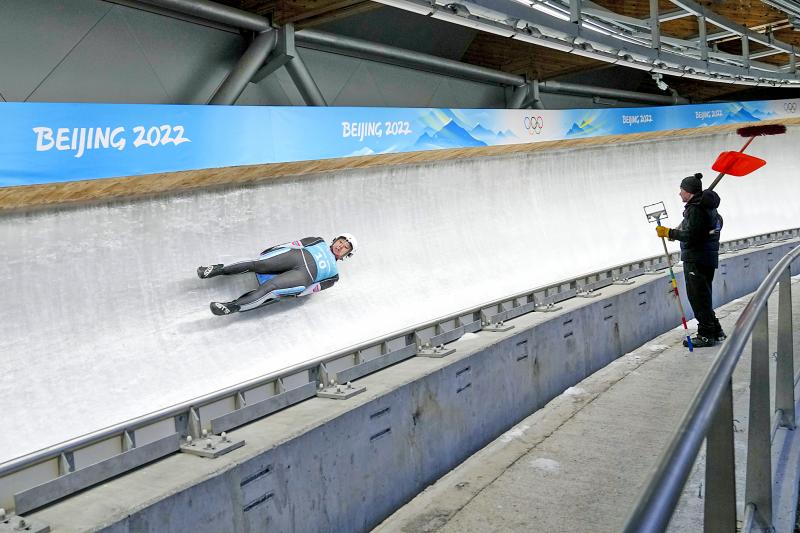An incident involving a Dutch reporter in the middle of a live broadcast who was dragged away by Chinese security officials was an isolated event and would not affect foreign media’s reporting at the Beijing Games, the International Olympic Committee (IOC) said yesterday.
The journalist, Sjoerd den Daas, was delivering his live report to public broadcaster NOS on Friday evening during the Games’ opening ceremony in the Chinese capital when several security officials surrounded him and one of them forcefully dragged him away.
Another security officer attempted to hold his hand in front of the camera as the reporter tried to continue speaking.

Photo: AP
The broadcaster had to interrupt the link with the reporter, leaving the studio anchor in the Netherlands confused.
“Obviously we have been in touch with the NOS, the state broadcaster, and it was an unfortunate circumstance,” IOC spokesman Mark Adams said. “I think someone was being overzealous. He [the reporter] was able to, very quickly afterward with the help of officials there, do his piece to camera.”
Games participants, including media, are restricted to a “closed loop,” which includes the venues, the media center and accommodations.
All participants must remain in that loop for the entire duration of the Games as part of China’s measures to minimize the risk of any COVID-19 spread during the Games until Feb. 20.
There have been concerns over whether visiting media would be allowed to freely do their job in China during the Olympics.
However, the IOC has repeatedly assured them that the contract signed with the Chinese hosts would allow every participant, including athletes and media, to speak freely within the loop.
“These things do happen, and I think it’s a one-off. I hope it’s a one-off, and we will assure you that within the closed loop you will be able to carry on your work,” Adams said.

US President Donald Trump yesterday announced sweeping "reciprocal tariffs" on US trading partners, including a 32 percent tax on goods from Taiwan that is set to take effect on Wednesday. At a Rose Garden event, Trump declared a 10 percent baseline tax on imports from all countries, with the White House saying it would take effect on Saturday. Countries with larger trade surpluses with the US would face higher duties beginning on Wednesday, including Taiwan (32 percent), China (34 percent), Japan (24 percent), South Korea (25 percent), Vietnam (46 percent) and Thailand (36 percent). Canada and Mexico, the two largest US trading

ACTION PLAN: Taiwan would expand procurement from the US and encourage more companies to invest in the US to deepen bilateral cooperation, Lai said The government would not impose reciprocal tariffs in retaliation against US levies, President William Lai (賴清德) said yesterday, as he announced five strategies to address the issue, including pledging to increase Taiwanese companies’ investments in the US. Lai has in the past few days met with administrative and national security officials, as well as representatives from various industries, to explore countermeasures after US President Donald Trump on Wednesday last week announced a 32 percent duty on Taiwanese imports. In a video released yesterday evening, Lai said that Taiwan would not retaliate against the US with higher tariffs and Taiwanese companies’ commitments to

‘SPECIAL CHANNEL’: Taipei’s most important tasks are to stabilize industries affected by Trump’s trade tariffs and keep negotiations with Washington open, a source said National Security Council Secretary-General Joseph Wu (吳釗燮) arrived in the US for talks with US President Donald Trump’s administration, a source familiar with the matter said on Friday. Wu was leading a delegation for a meeting known as the “special channel,” the Financial Times reported earlier. It marked Trump’s first use of the channel since returning to the White House on Jan. 20. Citing a source familiar with the matter, the Financial Times reported that Minister of Foreign Affairs Lin Chia-lung (林佳龍) was also a part of the delegation. The visit came days after China concluded war games around Taiwan and amid Trump’s

CHIP EXCEPTION: An official said that an exception for Taiwanese semiconductors would have a limited effect, as most are packaged in third nations before being sold The Executive Yuan yesterday decried US President Donald Trump’s 32 percent tariff on Taiwanese goods announced hours earlier as “unfair,” saying it would lodge a representation with Washington. The Cabinet in a statement described the pledged US tariffs, expected to take effect on Wednesday next week, as “deeply unreasonable” and “highly regrettable.” Cabinet spokeswoman Michelle Lee (李慧芝) said that the government would “lodge a solemn representation” with the US Trade Representative and continue negotiating with Washington to “ensure the interests of our nation and industries.” Trump at a news conference in Washington on Wednesday announced a 10 percent baseline tariff on most goods